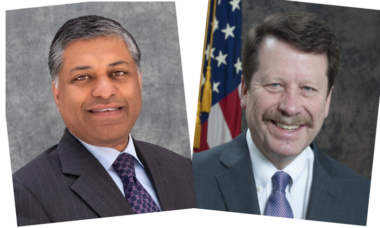 Rahul Gupta has been confirmed by the US Senate as director of National Drug Control Policy, while president Joe Biden has also announced that he intends to nominate Robert Califf as head of the US Food and Drug Administration (FDA) – potentially the strongest pro-cannabis moves so far from the often-reluctant Biden administration.
Rahul Gupta has been confirmed by the US Senate as director of National Drug Control Policy, while president Joe Biden has also announced that he intends to nominate Robert Califf as head of the US Food and Drug Administration (FDA) – potentially the strongest pro-cannabis moves so far from the often-reluctant Biden administration.
Gupta (pictured left), who will oversee US anti-drug efforts, was previously a consultant to cannabis company Holistic Industries and acted as chair of the West Virginia Medical Cannabis Advisory Board. The new drug czar has also made a couple of favourable public comments about medical cannabis.
However, he has also been critical of the cannabis legalisation progress, pointing out teenage use of cannabis outstripping that of conventional tobacco cigarettes – which could also be framed as a net positive for public health.
Realistically there is little the director could do on cannabis legalisation, even if Gupta wanted to make such a move. The National Drug Control Policy Reauthorization Act (1998) states that the Office of National Drug Control Policy take such actions as necessary to oppose any attempt to legalise the use of a substance (in any form) that is listed in schedule I of the US Controlled Substances Act.
For this reason, opponents of cannabis liberalisation, such as the lobbying group Smart Approaches to Marijuana (SAM) have not opposed Gupta’s appointment. Though he was not their preferred candidate, at the time of the nomination SAM president Kevin Sabet said: “Rahul has a strong public health background, but he also knows how to work with law enforcement and other stakeholders. He has a record of convening different constituencies, which will serve him well in this role. It’s a strong selection.”
Opioid crisis the priority
Gupta’s primary focus will be the ongoing opioid crisis in the US rather than cannabis use. “President Biden has made clear that addressing addiction and the overdose epidemic is an urgent priority. As director, I will diligently work to advance high-quality, data-driven strategies to make our communities healthier and safer,” said Gupta.
Despite this it is widely thought that having the first ever medical doctor appointed to head the Office of National Drug Control Policy – and someone sympathetic to medical cannabis – is a plus in a Democratic administration that has been reluctant to express support for liberalisation despite the growing backing for such a move among its supporter base.
The impending nomination of Califf (pictured right) to return to the post of FDA commissioner he held during the last year of the Barack Obama administration in 2016-17 has also been welcomed for similar reasons.
The pick for head of the agency has still not been formally made and the appointment will then need to be confirmed by the Senate. But assuming that happens, it could be a positive for the cannabinoid-related sectors.
Califf expressed positive views about the potential of cannabinoids when he previously heading the FDA. At that time he noted that while the agency had not determined cannabis to be safe for any indication, that did not mean it was not and there were several positive potential promising applications that would benefit from further research – research the FDA was looking to help promote.
He added that during his work as a cardiologist he “had the chance to prescribe some [cannabinoid products] in my cardiology practice in people with extreme heart failure who get a wasting cachectic syndrome”.
What This Means: While it is hard to say what these decisions mean for CBD as a potential ingestible consumer product, the appointments are probably overall a small positive for cannabis in general.
Califf’s likely reappointment would have the greater impact on CBD specifically though he was unable, unwilling or unconcerned enough to make any impact on its regulation during his previous spell in charge of the FDA. These is no reason to believe at this moment that things will be very different this time around.
– Freddie Dawson CBD-Intel staff
Photos: Harvard University / Wikimedia Commons







